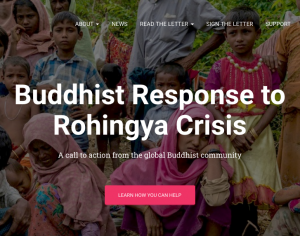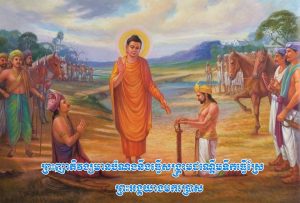Dear Friends of the Buddhist Humanitarian Project,
We have watched with growing alarm the worsening fighting in Myanmar. We are getting new reports of war crimes.
As a supporter of our work, we are writing to update you on these reports, to ensure that you are familiar with what we are doing and what is happening on the international level. We also want you to know how we intend to continue our efforts.
Long-standing conflicts have flared up, most recently in Rakhine State, where the the Rohingya people have long lived peacefully alongside Rakhine Buddhists.
Having driven more than 800,000 Muslim Rohingya out of the country to Bangladesh, a conflict has now flared up between the Myanmar army and local Buddhists in Rakhine and Chin states.
At the end of June, the military launched fresh “clearance operations” in Rakhine. Local Buddhist fighters, calling themselves the Arakan Army, are seeking autonomy from the central government. The military, which has been accused of stationing troops inside the area’s ancient Buddhist temples, is reported to have ordered 10,000 villagers out of their homes and ancestral lands.
A local council of Buddhist monks had already appealed to the authorities to stop the military from stationing soldiers at Thone Sat Tabone pagoda and opening fire from there.
This month, Amnesty International issued a chilling report on the military operations. It said indiscriminate airstrikes were killing civilians, including children, and that these amounted to war crimes. “Despite mounting international pressure on the military’s operations in the area, including at the International Court of Justice, the shocking testimonies we have collected show just how deep impunity continues to run within Myanmar military ranks.”
Meanwhile, nearly 1,000,000 Rohingya people languish, stateless and vulnerable in the Cox’s Bazaar area of coastal Bangladesh. They are caged in the world’s largest refugee camps, where they fled nearly three years ago. These camps, an unimaginably crowded maze of tents and bare earth, is now under constant threat from the COVID-19 pandemic. There are cases in the camp, and great fear that it can, at any moment, burn through the population.
Our global appeals and work inside Myanmar
 Since the beginning of this crisis, the Buddhist Humanitarian Project has helped organize several appeals to officials in Myanmar, to the US State Department, and to the United Nations. These appeals have been signed by hundreds of Buddhist teachers, monks, and practitioners, including some of the most prominent Buddhist figures in Asia and the West.
Since the beginning of this crisis, the Buddhist Humanitarian Project has helped organize several appeals to officials in Myanmar, to the US State Department, and to the United Nations. These appeals have been signed by hundreds of Buddhist teachers, monks, and practitioners, including some of the most prominent Buddhist figures in Asia and the West.
In one of our efforts, we took out full-page advertisements in Myanmar’s leading newspapers. In our last appeal, a partner in Myanmar hand-delivered letters to leadership in Myanmar.
With the exception of a single response to one of us from the country’s monastic council, saying they were unable to meet us, we have heard nothing – although a number of us are in direct contact with courageous Buddhists, both monastics and laypeople. They are working to counteract inter-communal hatred and violence and to reach out to the Muslim minority throughout the country with gestures of peace, practical assistance and concern. Our contribution, partnering with our sister Clear View Project, includes the underwriting of workshops in peacebuilding, communal harmony, and conflict reduction among various ethnic communities—a long, slow process that calls for patience and persistence.
A number of our leading members have written about this crisis in major Buddhist magazines, calling for a response from the global community of practitioners.
In the US, we organized a speaking tour by Saffron Revolution monk Ashin Issariya from Wimoteti Thuka Monastery in Myanmar. For years, he has been outspoken in opposing the misrepresentation of the Buddha’s teachings by extremist monastics in his country. On his tour he visited Burmese communities in California, the Midwest, and Washington DC, and spoke at an all-day conference on the Rohingya crisis, hosted by the Boulder Shambhala Center
International developments
In December the UN General Assembly voted overwhelmingly to condemn human rights abuses against the Rohingya and other minorities, including arbitrary arrests, torture, rape and deaths in detention. The detailed resolution called on Myanmar’s government to take urgent measures to combat incitement of hatred against the Rohingya and other minorities in Rakhine, Kachin and Shan states. This was an important statement on the part of the international community, but action lags far behind.
A month later the International Court of Justice voted unanimously to order Myanmar to take “all measures within its power” to prevent genocide. The panel of seventeen judges said the Rohingya still faced this threat. The justices ordered the Myanmar government to prevent killing and “causing serious bodily or mental harm” to members of the group, as well as preserve evidence of possible genocide that has already occurred.
The Buddhist Humanitarian Project: Three Directions
We at the Buddhist Humanitarian Project have assessed these developments, including the most recent dreadful news, and our experience of working in this crisis. We feel that our efforts are best spent in three directions:
- Raising funds for direct relief of Rohingya communities in Bangladesh and inside Rakhine State.
- Peacebuilding training in Rakhine State, and among Buddhist monastics across Myanmar.
- Working for much more active efforts for peace in Myanmar on the part of governments around the world — including in the US where the current Senate and government have refused to take effective action.
We value your sustained concern for the people of Myanmar and for the work that the Buddhist Humanitarian Project is doing. At this time, there are two offerings that will help maintain this work:
- Please feel free to send us any reflections you have — contact us. It is extremely important in our work to show that a wide range of Buddhist leaders, teachers and practitioners are deeply concerned by all forms of extremism and violence. (Our initial appeal has been signed by over 1,600 Buddhists from more than a dozen countries.)
- Please continue to support us with your donations. So far, we have raised more than $50,000 to provide humanitarian assistance to the Rohingya refugees in the huge camps on the Myanmar/Bangladesh border. Click here to donate or use the button below.
The inspiration of the Buddha
 We continue to draw inspiration from the life and teachings of the Buddha. The Buddha’s teachings on peace and social harmony could not be clearer. (Please see Bhikkhu Bodhi’s anthology, The Buddha’s Teachings on Social and Communal Harmony.)
We continue to draw inspiration from the life and teachings of the Buddha. The Buddha’s teachings on peace and social harmony could not be clearer. (Please see Bhikkhu Bodhi’s anthology, The Buddha’s Teachings on Social and Communal Harmony.)
The life of the Buddha is also replete with examples. It is common throughout Asia to see paintings of the Buddha intervening to prevent war between two sets of his relatives, the Sakyans and the Kolyans, whose armies were massing on either side of the Rohini River. They had failed to resolve their dispute over the use of the waterway and were on the brink of armed conflict.
This crisis was brought to the attention of the Buddha and he thought to himself: “If I refrain from going to them, these people will destroy each other. It is clearly my duty to go to them.”
Some paintings depict him travelling through the sky and stopping in mid-air immediately above the middle of the river. His relatives seeing him peacefully sitting above them in the sky, are said to have laid aside their weapons and paid homage to him. The Buddha told them: “If I had not stopped you today, your blood would have been flowing like a river by now.”
Other images, like the one above, show him standing between the armies with his hand raised in the mudra of fearlessness.
It is widely believed that it was at this time that the Buddha composed this verse, now well-known in the Dhammapada:
“Among those who hate, happily do we live without hatred. In the presence of those filled with hatred, we dwell in their midst without hating.”
We thank all of you, our good friends and supporters, for carrying this fearless message in your hearts at this time of great peril in our world.
In Peace,
Richard Reoch
Hozan Alan Senauke
Jill Jameson
Derek Pyle
Khin Mai Aung
P.S. Please feel free to share this letter with friends and members of your community.
May all beings be safe.